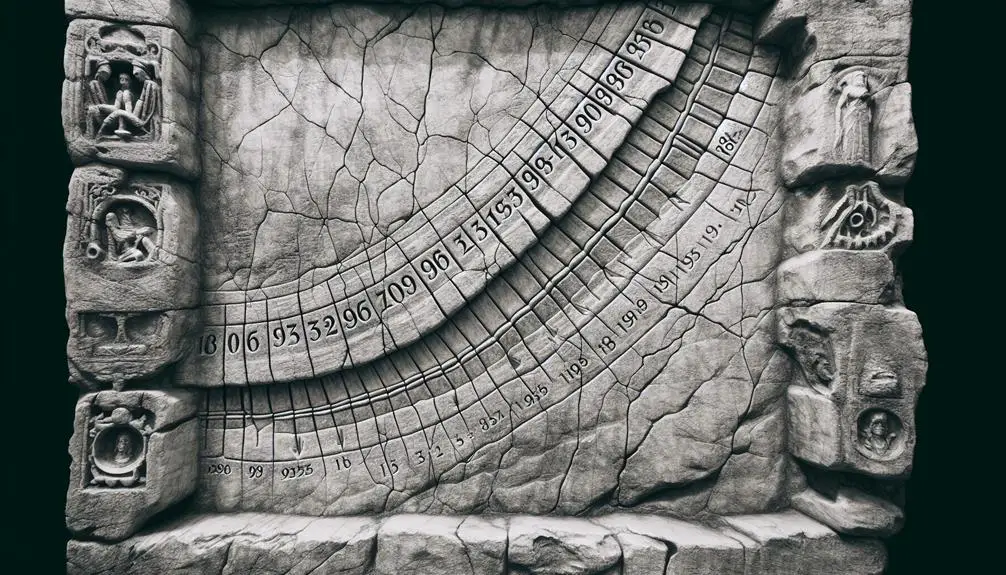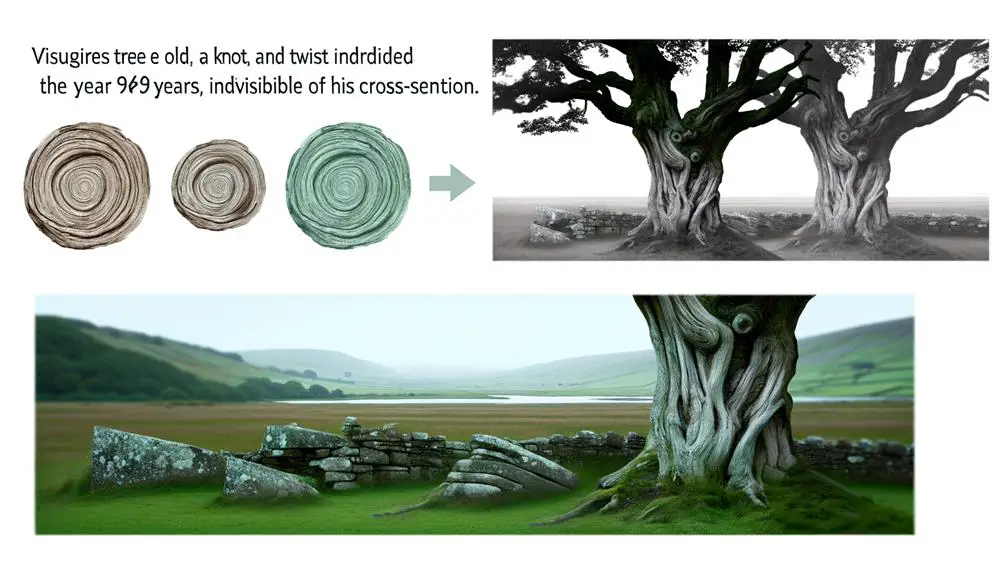This biblical figure lived an astonishing 969 years, uncovering the ancient world's fascinating views on longevity and the divine—discover more inside.

How Long Did Methuselah Live in the Bible
Like a tree that has stood the test of centuries, Methuselah's age in the Bible stretches beyond the bounds of modern human lifespans, clocking in at an astonishing 969 years. You might wonder how someone could live that long and what it signifies within the broader biblical narrative.
The number 969 isn't just a figure; it's a gateway into understanding the ancient world's perceptions of time, longevity, and divinity. As you explore Methuselah's story, you'll uncover layers of historical, cultural, and spiritual meaning that could change how you view the ancient texts.
The significance of Methuselah's age is more than a number; it's a piece of a puzzle that spans generations, cultures, and beliefs.
Key Takeaways
- Methuselah lived for 969 years according to the Scriptures, making him the oldest person mentioned in the Bible.
- His age symbolizes completeness, divine plans, and is seen as a sign of God's patience.
- Interpretations of Methuselah's longevity often lean towards symbolic rather than literal, reflecting ancient beliefs in human potential and divinity.
- The story of Methuselah and his age enriches the biblical narrative, offering insights into ancient perspectives on aging and mortality.
Methuselah's Age Revealed

Methuselah's age, disclosed in the biblical narrative, stretches to an astonishing 969 years, making him the oldest person recorded in the Scriptures. This figure has sparked intense genealogical debates and investigations into aging theories within scholarly communities. You'll find that the discussion isn't merely about the literal acceptance of his age but delves deeper into the symbolic and historical contexts that surround these ancient texts.
Genealogical debates often center on the methodology of ancient timekeeping and the transmission of oral histories before they were inscribed in written form. Scholars suggest that the ages recorded in the Scriptures, especially in the antediluvian (pre-flood) period, may not correspond directly to the solar years as you understand them today. Some propose that these were lunar months or symbolic figures, representing virtue or significance rather than literal time. This perspective introduces a complex layer to understanding Methuselah's age, emphasizing the need to consider cultural, historical, and linguistic contexts when interpreting ancient texts.
Aging theories related to Methuselah's longevity also provoke fascinating discussions. Some scholars look towards explanations grounded in mythological traditions, where extended lifespans serve to elevate the narrative's heroes, distinguishing them from ordinary mortals. Others, however, speculate on the potential biological or environmental conditions that could support such longevity, though these theories often veer into speculative territory.
In dissecting Methuselah's age, you're engaging with a broader inquiry into the nature of biblical historiography, the methodologies of ancient storytelling, and the intersection of faith, myth, and history. This analysis not only enriches your understanding of a single biblical figure but also offers insights into the complex tapestry of human belief and knowledge transmission through ages.
The Significance of 969 Years

Delving into the biblical account, one discovers that the figure of 969 years carries a significance that transcends mere chronological measurement, inviting a deeper exploration of its symbolic and cultural implications. This age, attributed to Methuselah, isn't just a number but a narrative device rich with meaning. By examining the context and the era's understanding of numerical symbolism, you're led to a fascinating intersection of faith, culture, and the human inclination towards age exaggeration.
- Numerical Symbolism: Numbers in ancient texts often held deeper meanings. The number 969 could symbolize completeness or a divine plan, suggesting Methuselah's life had a purpose beyond its length.
- Methuselah as a Symbol: His extended lifespan can be seen as a symbol of God's patience and the impending judgment during his lifetime, which culminated in the Great Flood.
- Age Exaggeration: This phenomenon isn't unique to the Bible. Ancient texts frequently used age exaggeration to imply virtue, wisdom, or divine favor.
- Cultural Significance: Methuselah's age reflects the cultural and religious beliefs of the time, offering insights into how longevity was revered and associated with closeness to the divine.
- Scholarly Interpretation: Scholars debate the literal versus symbolic reading of Methuselah's age, contributing to a broader discussion on the interpretation of biblical ages.
Understanding Methuselah's age involves more than grappling with the feasibility of living for nearly a millennium; it's about appreciating the layers of meaning such a figure conveys in a world where numbers did more than count—they told stories, conveyed morals, and connected humanity with the divine.
Biblical Lifespans Explained

Turning our attention to the broader canvas of biblical lifespans, it's essential to realize that these figures often serve as more than just markers of time, embodying layers of meaning and theological significance within the scriptural narrative. When you dig deeper, the extraordinary ages reported in the Bible, such as Methuselah's 969 years, prompt intriguing questions about the genetic implications and the influence of ancient diets on longevity.
From a scholarly perspective, analyzing these biblical lifespans through the lens of genetics opens a fascinating dialogue. It suggests a possibility that early humans, as depicted in the Bible, possessed unique genetic traits that contributed to their exceptional longevity. This viewpoint isn't purely speculative; it's grounded in the understanding that genetic mutations and environmental factors significantly affect human lifespan. Hence, the biblical record might be pointing towards a time when human genetics were markedly different from today's.
Furthermore, the role of ancient diets in contributing to these extended lifespans can't be understated. It's widely acknowledged that dietary habits have a profound impact on health and longevity. The biblical era's reliance on whole, unprocessed foods, free from modern additives and pollutants, might've played a crucial role. This perspective aligns with current nutritional science, which associates such diets with reduced risks of chronic diseases and increased lifespan.
Methuselah in Historical Context

Understanding the historical context of Methuselah's era provides invaluable insights into the intersection of biblical narrative and ancient human civilization. The age attributed to Methuselah, 969 years, isn't only a figure of longevity but also serves as a bridge to understanding the cultural and symbolic significance of age in ancient times.
To grasp the complexity of Methuselah's historical backdrop, consider the following elements:
- Genealogical discrepancies: Scholars have noted variations in genealogical records between different ancient texts. These discrepancies suggest that the ages recorded in the Bible, including Methuselah's, may serve symbolic rather than literal purposes.
- Cultural symbolism: Methuselah's remarkable age has been interpreted as a symbol of wisdom and connection to the divine, reflecting ancient cultures' reverence for elders.
- Chronological frameworks: The biblical timeline, including Methuselah's lifespan, provides a scaffold that links genealogies to significant events, such as the Flood.
- Comparative mythology: Similar tales of long-lived individuals in other ancient cultures suggest a common motif that transcends a single tradition, pointing to a broader human fascination with longevity.
- Historical documentation: The lack of external corroboration for Methuselah's age from contemporary historical records challenges modern readers to consider the narrative's intent and the cultural context of its origin.
Through a scholarly lens, these elements underscore the importance of viewing Methuselah not just as a figure of extreme age, but as a key to understanding the intricate weave of genealogy, cultural symbolism, and historical narrative in ancient texts.
Interpreting Methuselah's Longevity

Within the biblical narrative, Methuselah's astounding lifespan of 969 years demands a nuanced interpretation, considering both its symbolic significance and its implications for understanding ancient perspectives on longevity and divinity. You've got to delve deeper than the surface level to grasp the rich layers of meaning behind this figure's extraordinary age. It's not just about the numbers; it's about what those numbers signify in the broader context of human existence and belief systems.
Exploring the genetic implications of Methuselah's age opens up a fascinating discussion. While modern science might dismiss such a lifespan as impossible, examining this tale through the lens of longevity myths allows for a broader understanding of ancient human narratives. These stories weren't just literal accounts but were imbued with metaphorical weight. They served to bridge the gap between the known and the unknown, casting light on humanity's quest for immortality and the divine.
Methuselah's age, therefore, isn't merely a figure to marvel at; it's a symbol. It reflects ancient beliefs about the potential for human life, the desire for connection with the divine, and the mysteries of our existence that remain just out of reach. This doesn't undermine the story's value; rather, it enriches it, offering you a window into the minds and hearts of those who lived millennia ago.
Frequently Asked Questions
What Role Did Methuselah Play in the Events Leading up to the Great Flood, and How Is His Story Connected to Noah's?
You might wonder about Methuselah's role before the great flood and his connection to Noah.
Although the Bible doesn't detail his actions during flood preparations, Methuselah's morality and lifespan symbolize a period of longsuffering and divine patience before judgment.
His death, occurring right before the flood, suggests a final marker of God's grace ending.
Essentially, Methuselah bridges humanity's ancient past with Noah's pivotal role in mankind's survival and moral reckoning.
Are There Any Extra-Biblical Texts or Ancient Manuscripts That Mention Methuselah or Give Additional Details About His Life?
In your search for Methuselah's genealogical significance, you'll find ancient texts beyond the Bible that mention him. One example, the Book of Enoch, delves into his life, offering a layer of lifespan verification not found in standard scriptures.
This extra-biblical text enriches our understanding of Methuselah, weaving a more detailed narrative of his life and roles. It's a scholarly pursuit that uncovers the depth of Methuselah's impact and longevity.
How Do Different Religious Traditions Outside of Judaism and Christianity View Methuselah and His Exceptionally Long Life?
You're diving into how different faiths perceive Methuselah's long life, beyond Judaism and Christianity.
Islamic perspectives view him through the lens of prophetic tradition, emphasizing his wisdom and longevity as signs of divine favor.
Hindu interpretations, while not directly mentioning Methuselah, parallel long-lived figures, suggesting a universal recognition of spiritual depth linked to age.
Both traditions, in their way, honor the concept of extended life as embodying profound spiritual truths.
What Are the Scientific and Historical Theories That Attempt to Explain the Purported Long Lifespans of Early Biblical Figures Like Methuselah?
You're diving into theories behind biblical figures' longevity. One fascinating angle is genetic mutations, potentially enabling longer lifespans. Researchers hypothesize that these anomalies, now lost, may have contributed.
Additionally, the interpretation of ancient calendar systems plays a crucial role. Different calendars could mean these ages aren't literal but symbolic, reflecting virtues or status rather than actual years lived, offering a blend of scientific and historical perspectives on this intriguing topic.
Has Methuselah's Name Been Used Symbolically or Metaphorically in Modern Literature, Art, or Culture, and if So, How and in What Contexts?
You've seen Methuselah's name pop up in various forms of modern culture, where it's often used as a metaphor for extreme longevity or ancient wisdom. This Methuselah metaphor symbolizes not just physical age but the accumulation of knowledge and experience over time.
From literature to art, the longevity symbolism attached to Methuselah's name challenges readers and viewers to ponder the value and impact of a prolonged existence in a transient world.
Conclusion
As you've journeyed through the ancient landscape of Methuselah's 969 years, it's clear his age isn't just a number but a symbolic beacon, echoing the longevity of a bygone era where divine intercession and human existence intertwined in the tapestry of biblical narratives.
This exploration into Methuselah's life, set against the backdrop of biblical lifespans, unravels the complexities of interpreting ancient texts.
It's a reminder, like the Pharaohs' pyramids, that some stories are built to transcend time, inviting endless scholarly pursuit.



Sign up